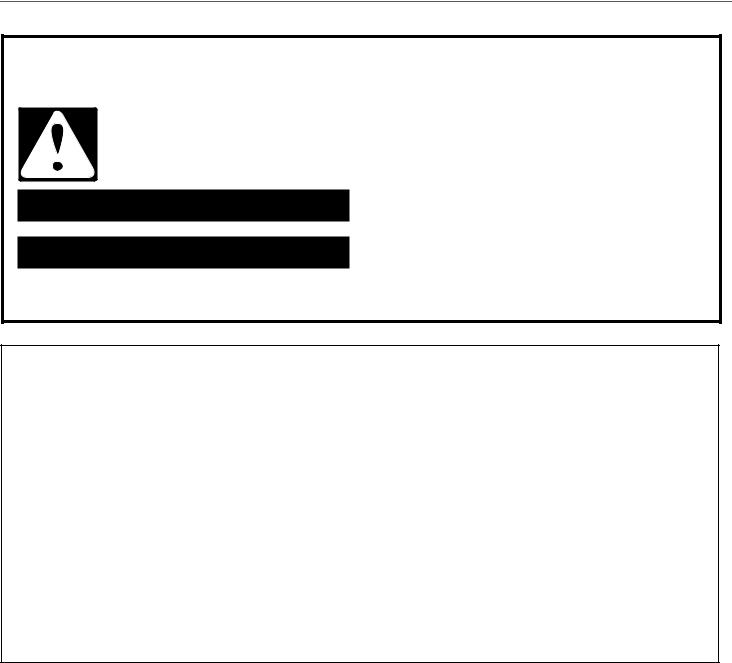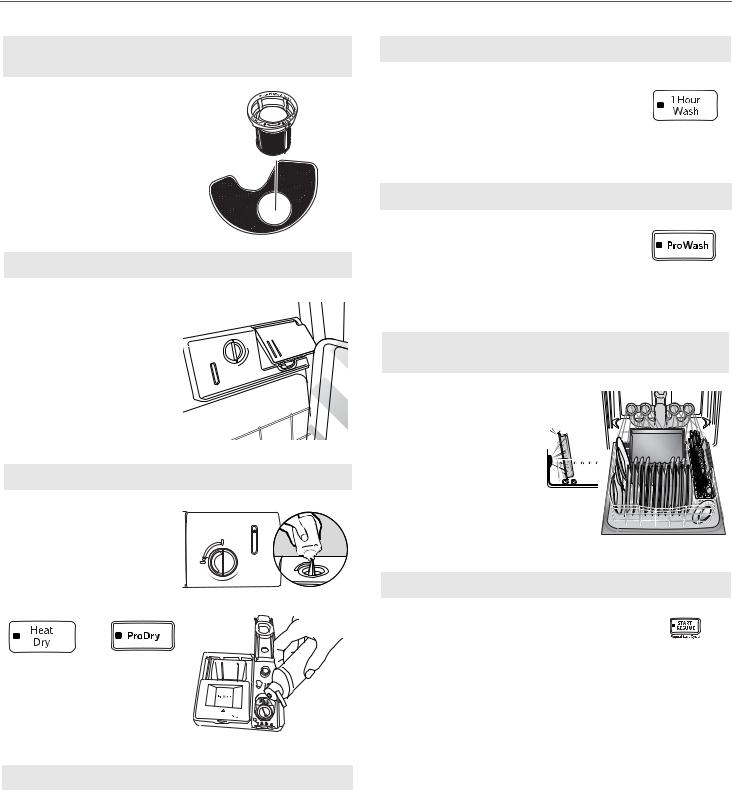KitchenAid KUDL15FXWH7, KUDL15FXWH5, KUDL15FXSS7, KUDL15FXSS5, KUDL15FXSS4 Owner’s Manual
...
DISHWASHER USER INSTRUCTIONS
THANK YOU for purchasing this high-quality product. Register your new dishwasher at www.kitchenaid.com. In Canada, register your dishwasher at www.kitchenaid.ca.
For future reference, please make a note of your product model and serial numbers. These can be located on the label located near the door on the right-hand or left-hand side of the dishwasher interior.
Model Number _____________________________________________ Serial Number_____________________________________________
Table of Contents |
|
DISHWASHER SAFETY ............................................................. |
2 |
PARTS AND FEATURES............................................................ |
4 |
START-UP/QUICK REFERENCE.............................................. |
5 |
QUICK STEPS............................................................................. |
6 |
DISHWASHER USE.................................................................... |
7 |
CYCLE AND OPTION DESCRIPTIONS .................................... |
9 |
DISHWASHER FEEDBACK SECTION.................................... |
13 |
DISHWASHER FEATURES...................................................... |
14 |
FILTRATION SYSTEM.............................................................. |
16 |
DISHWASHER CARE ............................................................... |
18 |
TROUBLESHOOTING .............................................................. |
19 |
WARRANTY .............................................................................. |
22 |
W10596243D

Dishwasher Safety
Your safety and the safety of others are very important.
We have provided many important safety messages in this manual and on your appliance. Always read and obey all safety messages.
This is the safety alert symbol.
This symbol alerts you to potential hazards that can kill or hurt you and others.
All safety messages will follow the safety alert symbol and either the word “DANGER” or “WARNING.” These words mean:
 DANGER
DANGER
 WARNING
WARNING
You can be killed or seriously injured if you don't immediately follow instructions.
You can be killed or seriously injured if you don't follow instructions.
All safety messages will tell you what the potential hazard is, tell you how to reduce the chance of injury, and tell you what can happen if the instructions are not followed.
IMPORTANT SAFETY INSTRUCTIONS
WARNING: When using the dishwasher, follow basic precautions, including the following:
■Read all instructions before using the dishwasher.
■Use the dishwasher only for its intended function.
■Use only detergents or rinse agents recommended for use in a dishwasher, and keep them out of the reach of children.
■When loading items to be washed:
1)Locate sharp items so that they are not likely to damage the door seal; and
2)Load sharp knives with the handles up to reduce the risk of cut-type injuries.
■Do not wash plastic items unless they are marked “dishwasher safe” or the equivalent. For plastic items not so marked, check the manufacturer's recommendations.
■Do not touch the heating element during or immediately after use.
■Do not operate the dishwasher unless all enclosure panels are properly in place.
■Do not tamper with controls.
■Do not abuse, sit on, or stand on the door, lid, or dish racks of the dishwasher.
■To reduce the risk of injury, do not allow children to play in or on the dishwasher.
■Under certain conditions, hydrogen gas may be produced in a hot water system that has not been used for two weeks or more. HYDROGEN GAS IS EXPLOSIVE. If the hot water system has not been used for such a period, before using the dishwasher turn on all hot water faucets and let the water flow from each for several minutes. This will release any accumulated hydrogen gas. As the gas is flammable, do not smoke or use an open flame during this time.
■Remove the door or lid to the washing compartment when removing an old dishwasher from service or discarding it.
SAVE THESE INSTRUCTIONS
2

GROUNDING INSTRUCTIONS
■For a grounded, cord-connected dishwasher:
The dishwasher must be grounded. In the event of a malfunction or breakdown, grounding will reduce the risk of electric shock by providing a path of least resistance for electric current. The dishwasher is equipped with a cord having an equipment-grounding conductor and a grounding plug. The plug must be plugged into an appropriate outlet that is installed and grounded in accordance with all local codes and ordinances.
WARNING: Improper connection of the equipmentgrounding conductor can result in a risk of electric shock.
Check with a qualified electrician or service representative if you are in doubt whether the dishwasher is properly grounded. Do not modify the plug provided with the dishwasher; if it will not fit the outlet, have a proper outlet installed by a qualified electrician.
■For a permanently connected dishwasher:
The dishwasher must be connected to a grounded metal, permanent wiring system, or an equipment-grounding conductor must be run with the circuit conductors and connected to the equipment-grounding terminal or lead on the dishwasher.
SAVE THESE INSTRUCTIONS
WARNING
Tip Over Hazard
Do not use dishwasher until completely installed.
Do not push down on open door.
Doing so can result in serious injury or cuts.
State of California Proposition 65 Warnings:
WARNING: This product contains one or more chemicals known to the State of California to cause cancer.
WARNING: This product contains one or more chemicals known to the State of California to cause birth defects or other reproductive harm.
3

Parts and Features
Upper level wash
Water feed tube  Model and serial number label
Model and serial number label 






Water inlet opening
Heating element
Rinse aid dispenser reduces spotting and improves drying.
Detergent dispenser (style and location vary)
Active vents
(on some models)
Premium top rack 

 adjusters
adjusters 



Flexible fold-down tines (on some models)
Upper spray arm 
ProScrub® (on some models) powerful jets target water toward pots,
pans, or casserole dishes loaded in the back of the dishwasher to clean stubborn messes.
Pressurized spray nozzles and variable speed motor provide effective cleaning.
Lower spray arm
Overfill protection float
EQ Filtration System removes soil
from water and improves cleaning action.
Control panel
Culinary tool rack/3rd level rack (on some models)
 Cup shelves with stemware holder
Cup shelves with stemware holder
Rack handle
TOP RACK
Silverware basket
Flexible fold-down tines
Culinary Caddy® utensil basket
(on some models)
BOTTOM RACK
4

Start-Up/Quick Reference (varies by model)
Clean EQ Wash System removable filters to maintain peak performance.
Cleaning the filters periodically helps keep the dishwasher working at peak performance. The filters can be found at the bottom center of your dishwasher.
See the “Filtration System” section for information on removing and maintaining the filters.
IMPORTANT: Do not block detergent dispenser.
For hinged style detergent dispensers, tall items placed in the lower rack may block the dispenser door. Cookie sheets and cutting boards loaded on the left-hand side of the dishwasher can easily block the dispenser. If detergent is inside of the dispenser or on the bottom of the tub after the cycle is complete, the dispenser was blocked.
Drying - Rinse aid is essential.
You must use a drying agent such as a rinse aid for good drying performance (sample included). Rinse aid along with the Heat Dry or ProDry™ option will provide best drying and avoid excessive moisture in the dishwasher interior.
or
For best drying, use the Heat Dry or ProDry™ option.
USE RINSE AID FOR
Full
BETTER DRYING
Lock
Add
Refill
SLIDE 
Dispensers vary by model
Proper Detergent Dosing
It is possible to use too much detergent in your dishwasher. This can lead to etching of your dishes. See “Add Detergent” and “Add Rinse Aid” in the “Dishwasher Use” section, to determine the amount of detergent needed based on your water hardness.
1 Hour Wash - When you need fast results.
Efficient dishwashers run longer to save water and energy, just as driving a car slower saves on gas. When you need fast results, the
1 Hour Wash will clean your dishes using slightly more water and energy. Select the Heat Dry or ProDry™ option to speed drying times (adds approximately 27 to 35 minutes to the 1 Hour Wash cycle).
ProWash™ cycle for optimal cleaning
The most advanced and versatile cycle. ProWash™ cycle senses the load size, soil amount, and toughness of soil, to adjust the cycle for optimal cleaning using only the amount of water and energy needed. The ProWash™ and Heavy Duty cycles are recommended for tough soil. No need to prerinse dishes; just scrape and load.
ProScrub® option for loading to clean baked-on food
(some models)
When the ProScrub® option is selected, it provides a concentrated wash on the back of the lower dish rack for hard-to-clean dishes. Place these dishes with the soiled surface of the dish toward the ProScrub® spray jets in the lower rack of the dishwasher.
Back of dishwasher
Press START/RESUME every time you add a dish.
IMPORTANT: If anyone opens the door (such as, for adding a dish, even during the Delay Hours option), the Start/Resume button must be pressed each time.
If the Start/Resume button is located on top of door: Push door firmly closed within
3 seconds of pressing START/RESUME. If the door is not closed within 4 seconds, the Start/ Resume button LED will flash, an audible tone will be heard, and the cycle will not start.
5

Quick Steps
Prepare and load |
3 |
Select a cycle and option. |
1 dishwasher. |
|
2 Add detergent for cleaning and rinse aid for drying.
4 Start dishwasher.
NOTE: If the Start/Resume button is located on the top of door, push door firmly closed within 3 seconds of pressing START/RESUME.
SLIDE
SLIDE 
Dispensers vary by model.
6

Dishwasher Use
STEP 1
Prepare and Load the Dishwasher
IMPORTANT: Remove leftover food, bones, toothpicks and other hard items from the dishes. Remove labels from containers before washing.
10-place load - upper rack |
10-place load - lower rack |
12-place load - upper rack |
|
|
12-place load - lower rack |
||||||||||||||||
4 |
4 |
|
4 |
|
4 |
4 |
|
4 |
4 |
|
1 |
|
1 |
|
1 |
1 |
1 |
4 |
|
|
5 |
|
5 |
|
5 |
|
5 |
|
|
|
|
|
|
|
|||||
|
|
|
|
|
|
5 |
|
5 |
|
5 |
1 |
5 |
|
|
|||||
|
5 |
|
1 |
|
1 |
|
1 |
|
1 |
|
|
|
5 |
||||||
|
|
|
|
|
|
|
|
|
|
|
|
|
|||||||
|
|
2 |
|
|
|
|
3 |
|
|
|
3 |
|
3 |
|
|||||
4 |
2 |
|
|
|
|
|
|
|
|
|
|
|
|
4 |
|||||
|
|
2 |
2 |
|
2 |
|
3 |
|
|
3 |
|
|
|
3 |
|||||
|
|
|
2 |
2 |
|
2 |
|
2 |
2 |
|
3 |
|
3 |
|
3 |
3 |
|||
|
|
|
|
10-place load – silverware basket |
|
|
|
||||||||||||
5 |
|
3 |
|
|
3 |
3 |
|
3 |
3 |
|
4 |
|
4 |
|
4 |
|
4 2 |
5 |
|
|
|
|
|
|
|
3 |
3 |
1 |
1 |
4 |
|||||||||
2 |
4 |
1 |
4 |
1 |
4 |
1 |
4 |
||||||||||||
|
|
3 |
1 |
3 |
1 |
|
1 |
|
1 |
|
|||||||||
|
4 |
1 |
|
1 |
|
1 |
|
1 |
3 |
|
|
4 |
|||||||
|
|
|
|
|
|
1 |
|
1 |
|
1 |
|
||||||||
4 |
2 |
2 |
1 |
|
1 |
2 1 |
|
2 1 |
|
2 |
|
|
|
3 |
|||||
1 |
|
|
2 |
2 |
1 |
2 |
1 |
2 |
1 |
6 |
|||||||||
|
|
|
2 |
|
|
|
|
|
|
3 |
|||||||||
12-place load – silverware basket
1 |
2 |
3 |
4 |
5 |
6 |
|
1. Teaspoon |
|
4. Knife |
|
|
|
2. Salad fork |
|
5. Tablespoon/large |
|
|
|
3. Dinner fork |
serving spoon |
|
||
|
|
|
6. Large serving fork |
||
■ Make sure nothing keeps spray arm(s) from spinning freely. It is important for the water spray to reach all soiled surfaces.
■ Make sure that when the dishwasher door is closed, no items are blocking the detergent dispenser.
■ Items should be loaded with
soiled surfaces facing down and
Do not block spray arms
inward to the spray as shown. This will improve cleaning and drying results.
■Avoid overlapping items like bowls or plates that may trap food.
■Place plastics, small plates, and glasses in the upper rack. Wash only plastic items marked “dishwasher safe.”
■To avoid thumping/clattering noises during operation, load dishes so they do not touch one another. Make sure lightweight load items are secured in the racks.
■Improper loading can cause dishes to be chipped or damaged. When loading glasses or mugs, it is best to load these items in between rows of tines instead of loading them over tines
as shown.
■When loading silverware, always place sharp items pointing down. Mix items in each section of the basket with some pointing up and some down to avoid nesting. Spray cannot reach nested items.
7
